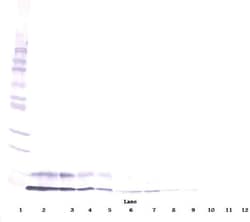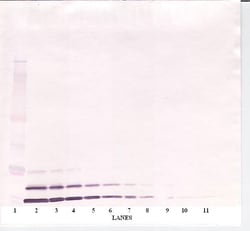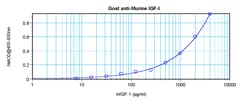Learn More
PeproTech IGF1 Polyclonal Antibody, PeproTech®, Invitrogen™

Description
AA Sequence of recombinant protein: GPETLCGAEL VDALQFVCGP RGFYFNKPTG YGSSIRRAPQ TGIVDECCFR SCDLRRLEMY CAPLKPTKAA. Preparation: Produced from sera of goats immunized with highly pure Recombinant Murine IGF-I. Anti-Murine IGF-I-specific antibody was purified by affinity chromatography employing an immobilized Murine IGF-I matrix. Sandwich ELISA: To detect Murine IGF-I by sandwich ELISA (using 100 μL/well antibody solution) a concentration of 0.5-2.0 μg/mL of this antibody is required. This antigen affinity purified antibody, in conjunction with PeproTech Biotinylated Anti-Murine IGF-I (500-P157GBt) as a detection antibody, allows the detection of at least 0.2-0.4 ng/well of Recombinant Murine IGF-I. Western Blot: To detect Murine IGF-I by Western Blot analysis this antibody can be used at a concentration of 0.1-0.2 μg/mL. Used in conjunction with compatible secondary reagents the detection limit for Recombinant Murine IGF-I is 1.5-3.0 ng/lane, under either reducing or non-reducing conditions.

Specifications
Specifications
| Antigen | IGF1 |
| Applications | ELISA, Western Blot |
| Classification | Polyclonal |
| Concentration | 0.1-1.0 mg/mL |
| Conjugate | Unconjugated |
| Formulation | PBS with no preservative |
| Gene | IGF1 |
| Gene Accession No. | P05017 |
| Gene Alias | C730016P09Rik; class 1 insulin-like growth factor I preproprotein; class 2 insulin-like growth factor I preproprotein; H-IGF-1; IBP1; IGF; IGF1; Igf-1; IGF1A; IGFI; Igf-I; IGFIa; IGF-IA; IGF-IB; insulin growth factor-1; Insulin like growth factor; insulin like growth factor 1; insulin-like growth factor 1; insulin-like growth factor 1 (somatomedin C); insulin-like growth factor I; insulin-like growth factor I (somatomedin C); insulin-like growth factor IB; mechano growth factor; MGF; M-IGF-1; OTTHUMP00000195084; prepro-IGF-I; prepro-insulin-like growth factor I; R-IGF-1; somatomedin; Somatomedin C; Somatomedin-C |
| Gene Symbols | IGF1 |
| Show More |
By clicking Submit, you acknowledge that you may be contacted by Fisher Scientific in regards to the feedback you have provided in this form. We will not share your information for any other purposes. All contact information provided shall also be maintained in accordance with our Privacy Policy.




